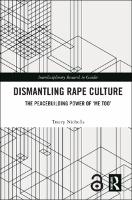Dismantling Rape Culture
Proposal review
The Peacebuilding Power of ‘Me Too’
| dc.contributor.author | Nicholls, Tracey | |
| dc.date.accessioned | 2020-11-05T10:09:43Z | |
| dc.date.available | 2020-11-05T10:09:43Z | |
| dc.date.issued | 2021 | |
| dc.identifier | OCN: 1247646791 | |
| dc.identifier.isbn | 9781003124290 | en_US |
| dc.identifier.isbn | 9780367546304 | en_US |
| dc.identifier.isbn | 9780367643898 | en_US |
| dc.identifier.uri | https://library.oapen.org/handle/20.500.12657/42839 | |
| dc.identifier.uri | https://library.oapen.org/handle/20.500.12657/46957 | |
| dc.description.abstract | "This book analyses rape culture through the lens of the ‘me too’ era. Drawing feminist theory into conversation with peace studies and improvisation theory, it advocates for peace- building opportunities to transform culture and for the improvisatory resources of ‘culture- jamming’ as a mechanism to dismantle rape culture. The book’s key argument is that cultural attitudes and behaviours can be shifted through the introduction of disrupting narratives, so each chapter ends with a ‘culture- jammed’ re- telling of a traditional fairy tale. Chapter 1 traces an overlap of feminist theory and peace studies, arguing that rape culture is most fruitfully understood through the concept of ‘structural violence.’ Chapter 2 investigates the gender scripts that rape culture produces, considering a female counterpart to the concept of ‘toxic masculinity’: ‘complicit femininity.’ Chapter 3 offers analysis of non- consensual sex and a history of consent education, culminating in an argument that we need to move beyond consent to conceptualise a robust ‘respectful mutuality.’ Chapter 4 ’s history of sexual harassment in the workplace and the rise of #metoo argues that its global manifestations are a powerful peace- building initiative. Chapter 5 situates ‘me too’ within a culture- jamming history, using improvisation theory to show how this movement’s potential can shape cultural reconstruction. This is a provocative and interventionist addition to feminist theory scholarship and is suitable for researchers and students in women’s and gender studies, feminist theory, sociology and peace studies." | en_US |
| dc.language | English | |
| dc.relation.ispartofseries | Interdisciplinary Research in Gender | en_US |
| dc.subject.classification | bic Book Industry Communication::J Society & social sciences::JF Society & culture: general::JFF Social issues & processes::JFFK Feminism & feminist theory | en_US |
| dc.subject.other | Social Science | |
| dc.subject.other | Feminism & Feminist Theory | |
| dc.title | Dismantling Rape Culture | en_US |
| dc.title.alternative | The Peacebuilding Power of ‘Me Too’ | |
| dc.type | book | |
| oapen.identifier.doi | 10.4324/9781003124290 | en_US |
| oapen.relation.isPublishedBy | 7b3c7b10-5b1e-40b3-860e-c6dd5197f0bb | en_US |
| oapen.relation.isFundedBy | b818ba9d-2dd9-4fd7-a364-7f305aef7ee9 | |
| oapen.relation.isbn | 9781003124290 | |
| oapen.collection | Knowledge Unlatched (KU) | |
| oapen.imprint | Routledge | |
| oapen.pages | 221 | en_US |
| oapen.identifier | https://openresearchlibrary.org/viewer/2a6c3c9d-63a6-46ab-bc1f-dc3d8e806704 | |
| oapen.identifier.isbn | 9781003124290 | |
| peerreview.anonymity | Single-anonymised | |
| peerreview.id | bc80075c-96cc-4740-a9f3-a234bc2598f1 | |
| peerreview.open.review | No | |
| peerreview.publish.responsibility | Publisher | |
| peerreview.review.stage | Pre-publication | |
| peerreview.review.type | Proposal | |
| peerreview.reviewer.type | Internal editor | |
| peerreview.reviewer.type | External peer reviewer | |
| peerreview.title | Proposal review | |
| oapen.review.comments | Taylor & Francis open access titles are reviewed as a minimum at proposal stage by at least two external peer reviewers and an internal editor (additional reviews may be sought and additional content reviewed as required). |

